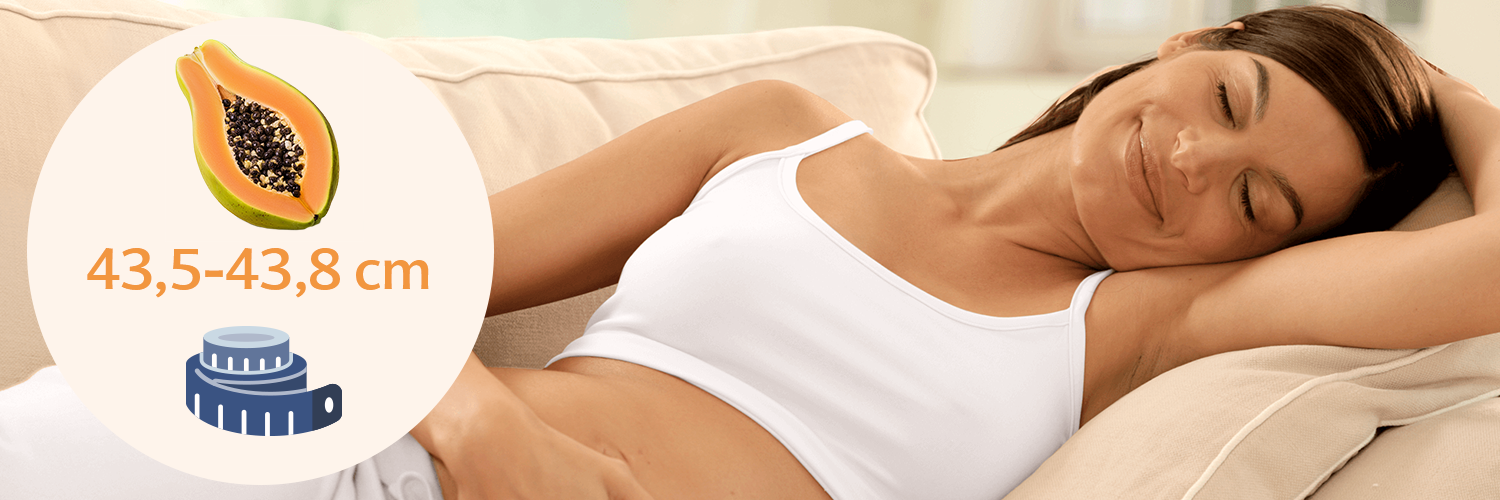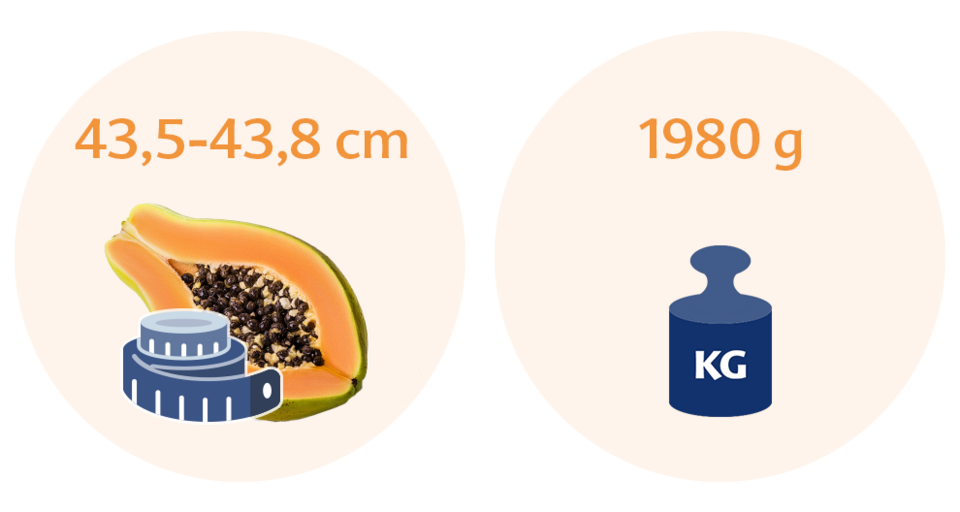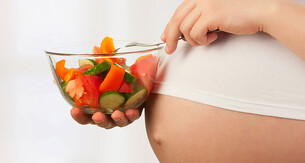In week 33, you’re in the ninth month of your pregnancy, the last stage of your baby’s development before the birth. It’s an exciting time, but there’s still no way to know exactly when they’ll be born – babies follow their own schedule. Most babies are born between week 37 and 41, so in a few weeks, it could happen at any time. This means you need to be prepared for the big moment.
Your baby’s development
Your baby is now fully developed. All their organs are in place and starting to do their jobs, and their sensory perception is coming along nicely: they can hear, taste, see and touch things with the sensory cells in their skin. Only the sense of smell is still missing - your baby’s 5th sense. It won’t be until after the birth that they start to notice and process smells, as they don’t have air to transmit smells to them in the womb.
Interesting fact: your baby would have a very good chance of surviving and growing into a healthy human being if they were born premature in week 33. They would find it difficult to maintain their internal body temperature if they were born now, but they could be placed in an incubator to help with this issue.
In week 33, their brain develops very quickly. Their head isn’t yet as big as it will be at birth, but as their brain gets bigger, their head increases in size too – it’ll grow by around 1.3 cm this week. In their skull, soft spots called fontanelles will form in the gaps between the bones. These fontanelles are important as they allow the skull’s bony plates to flex during birth (which protects your baby’s brain and helps their head to pass through the birth canal), and they also give their brain enough space to grow once they’re born. The small fontanelle at the back of their head will fuse by the time they’re three months old, while the second and larger fontanelle in the centre of the top of their head will fuse by the time they’re 12 months old.
Your baby’s skeletal system is also fully developed, although their bones still need to harden further in order to withstand the pressure of labour and childbirth. At birth, however, their bones are not yet fully hardened. Your baby’s development will continue in their first few weeks and months in the big wide world, and these will be monitored by your paediatrician. They’ll focus on your baby’s sensory system, reflexes, movements and intestinal development, as well as tracking how their length and width are developing.
As the time approaches, your baby will increasingly adopt the right position for birth, the cephalic position. Their exact position will be checked at every appointment you have with your doctor and midwife: the doctor will use ultrasound, while the midwife will use her hands.
What it’s like for the mum-to-be in week 33
The fundus (the top of your uterus) is now about three finger widths below your costal arch, putting considerable pressure on your lungs and lower down on your bladder. This means that you’ll now be out of breath more often, the chances of heartburn are higher, and you’ll still need to pee a lot more often.
Common signs and symptoms
Swollen legs and feet
Excess fluid in the tissue in your legs and feet often leads to even more painful swelling than you’ve already experienced. Getting plenty of rest and putting your legs in a raised position are simple things you can do to help alleviate these symptoms.
Midwife’s advice
‘Make boiled potatoes, cucumbers, rice and pineapple part of your diet – they’re easy ways to stop your body retaining as much water. Days when you eat nothing but rice are not recommended anymore.’ Dorothee Kutz, midwife
Your baby’s movements become more forceful
Your baby is now moving around and turning so much in your womb that it can literally take your breath away and make you stop what you’re doing. If you’re expecting twins, it can feel like there’s a storm raging in your belly. Don’t worry: it’s completely normal and, in fact, it’s important for your baby to do this so that they can get into the right position for birth.
Your thoughts revolve around your baby
You’ll be thinking constantly about how life is going to be when your baby comes. At the moment, you might not know how you’ll cope with it, and if you’ve talked to other mums, that might just have increased your worries. Although giving birth is very painful, and the first few weeks with your baby are a stressful time, it won’t stay with you: mums are mostly able to put it out of their minds, a natural “instinct” that means they’re not put off from having another baby.
It’s now time to pack your bag for the birth. By now, you’ll have bought lots of your baby’s first clothes, and you and/or your partner will have assembled their cot. When decorating and furnishing the room they’ll be in, remember that safety comes first: remove all unnecessary decorative items like cushions or cuddly toys, and don’t over-insulate the bed if it’s warm (valance sheets will only be needed if there’s a draught in the room). Hot water bottles, heated cushions and fleeces are also not a good idea, as they can result in your baby becoming too hot and increase their risk of suffocating.
Your body prepares for the birth with practice contractions
In week 33, you’ll often feel your belly become harder for short periods of time as your body trains for the imminent birth of your child. These practice contractions will become more and more intense until you get what’s called false labour, contractions which result in your uterus moving down towards your lesser pelvis. With the pressure reduced on your internal organs (particularly your lungs), you’ll be able to breathe more easily, relax a little more and look forward to the moment when you hold your baby in your arms for the first time.
Questions you may want to ask your doctor or midwife
Hard belly: false labour or actual labour?
As your body (and your abdominal muscles in particular) is now making intensive preparations for giving birth, there might be times when you’re not sure what’s happening. When you experience contractions, and you don’t know what kind of contractions they are, the safest option is to ask your midwife to explain how you can assess and distinguish the contractions.
If you suspect it could be the real thing, your midwife will quickly be able to find out if it’s false labour or if real labour has already begun. In this situation, it’s better to ask too many questions than to ignore your worries: a premature birth should still be prevented in week 33 so that your baby has another few weeks to grow in your womb and get ready for birth and life in the big wide world.
If you experience symptoms such as nausea, diarrhoea, pains that feel like period pains, general stomach aches or back pain, visit your doctor immediately and tell your midwife.
Information about the author:
Juliane Jacke-Gerlitz is a registered nurse. She has been working in the field of mother and breastfeeding counselling for more than ten years. Currently she is working as a medical writer and psychological consultant. Juliane Jacke-Gerlitz has been married for 22 years, is a mother of eight children and lives with her family in Halle.






